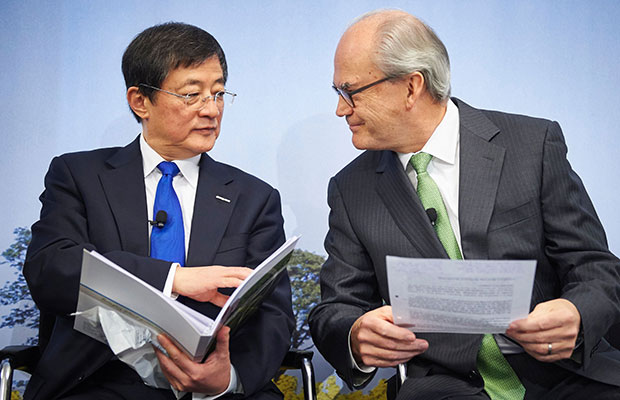ChemChina acquires Syngenta in $42bn deal
China finalises its most expensive foreign takeover yet, after US watchdog approves multibillion-dollar deal with Swiss agribusiness Syngenta

Ren Jianxin, Chairman of ChemChina, and Michel Demare, Chairman of Syngenta, at a press conference in February 2016
On August 22, state-owned China National Chemical Corp, also known as ChemChina, announced that it had acquired the Swiss agribusiness Syngenta in what will be China’s most ambitious foreign takeover bid to date.
“China National Chemical Corporation (ChemChina) and Syngenta today announced that the companies have received clearance on their proposed transaction from the Committee on Foreign Investment in the United States (CFIUS)”, according to a joint statement by the two companies.
The multibillion-dollar deal marks another significant acquisition for China in what has been a record year of foreign spending for the nation. So far in 2016, China has spent $159.2bn in overseas deals, far surpassing last year’s record of $105.7bn.
The takeover also serves as a significant setback for US agricultural giant Monsanto, which failed to acquire Syngenta in 2015.
So far in 2016, China has spent $159.2bn in overseas deals, far surpassing last year’s record of $105.7bn
The timing of the deal comes as China looks to improve food security for its rapidly growing population. “ChemChina has a very ambitious vision of the industry”, said Syngenta’s Chairman, Michel Demaré, when the deal was first announced. “Obviously it is very interested in securing food supply for 1.5 billion people and as a result knows that only technology can get them there.” Links with Syngenta will give ChemChina a significant foothold in the US agricultural market, as well as opening the nation up to global food networks.
ChemChina first proposed the $42bn takeover in February 2016, yet investors initially doubted that US watchdogs would clear the deal, sending Syngenta’s shares plummeting in price. Despite Demaré insisting there were “no security issues to be concerned about”, the deal has long attracted criticism from sceptics who fear foreign involvement in the US’ agriculture industry.
The acquisition has also sparked concerns over an ever-shrinking circle of global agricultural suppliers. Currently, less than a dozen multinational corporations control nearly 70 percent of the global seed industry, and a recent spate of acquisitions and mergers could very well suggest that competition within the market will shrink further still.













